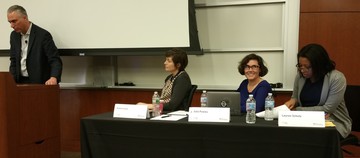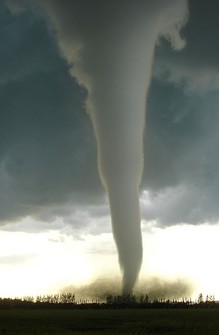Twister
 "We were kids working on the new stuff," said Kevin Werbach. "Now it's 20 years later and it still feels like that."
"We were kids working on the new stuff," said Kevin Werbach. "Now it's 20 years later and it still feels like that."
Werbach was opening last weekend's "radically interdisciplinary" (Geoffrey Garrett) After the Digital Tornado, at which a roomful of internet policy veterans tried to figure out how to fix the internet. As Jaron Lanier showed last week, there's a lot of this where-did-we-all-go-wrong happening.
The Digital Tornado in question was a working paper Werbach wrote in 1997, when he was at the Federal Communications Commission. In it, Werbach sought to pose questions for the future, such as what the role of regulation would be around...well, around now.
Some of the paper is prescient: "The internet is dynamic precisely because it is not dominated by monopolies or governments." Parts are quaint now. Then, the US had 7,000 dial-up ISPs and AOL was the dangerous giant. It seemed reasonable to think that regulation was unnecessary because public internet access had been solved. Now, with minor exceptions, the US's four ISPs have carved up the country among themselves to such an extent that most people have only one ISP to "choose" from.
To that, Gigi Sohn, the co-founder of Public Knowledge, named the early mistake from which she'd learned: "Competition is not a given." Now, 20% of the US population still have no broadband access. Notably, this discussion was taking place days before current FCC chair Ajit Pai announced he would end the network neutrality rules adopted in 2015 under the Obama administration.
Everyone had a pet mistake.
Tim Wu, regarding decisions that made sense for small companies but are damaging now they're huge: "Maybe some of these laws should have sunsetted after ten years."
A computer science professor bemoaned the difficulty of auditing protocols for fairness now that commercial terms and conditions apply.
Another wondered if our mental image of how competition works is wrong. "Why do we think that small companies will take over and stay small?"
Yochai Benkler argued that the old way of reining in market concentration, by watching behavior, no longer works; we understood scale effects but missed network effects.
Right now, market concentration looks like Google-Apple-Microsoft-Amazon-Facebook. Rapid change has meant that the past Big Tech we feared would break the internet has typically been overrun. Yet we can't count on that. In 1997, market concentration meant AOL and, especially, desktop giant Microsoft. Brett Fischmann paused to reminisce that in 1997 AOL's then-CEO Steve Case argued that Americans didn't want broadband. By 2007 the incoming giant was Google. Yet, "Farmville was once an enormous policy concern," Christopher Yoo reminded; so was Second Life. By 2007, Microsoft looked overrun by Google, Apple, and open source; today it remains the third largest tech company. The garage kids can only shove incumbents aside if the landscape lets them in.
"Be Facebook or be eaten by Facebook", said Julia Powles, reflecting today's venture capital reality.
Wu again: "A lot of mergers have been allowed that shouldn't have been." On his list, rather than AOL and Time-Warner, cause of much 1999 panic, was Facebook and Instagram, which the Office of Fair Trading approvied OK because Facebook didn't have cameras and Instagram didn't have advertising. Unrecognized: they were competitors in the Wu-dubbed attention economy.
 Both Bruce Schneier, who considered a future in which everything is a computer, and Werbach, who found early internet-familiar rhetoric hyping the blockchain, saw more oncoming gloom. Werbach noted two vectors: remediable catastrophic failures, and creeping recentralization. His examples of the DAO hack and the Parity wallet bug led him to suggest the concept of governance by design. "This time," Werbach said, adding his own entry onto the what-went-wrong list, "don't ignore the potential contributions of the state."
Both Bruce Schneier, who considered a future in which everything is a computer, and Werbach, who found early internet-familiar rhetoric hyping the blockchain, saw more oncoming gloom. Werbach noted two vectors: remediable catastrophic failures, and creeping recentralization. His examples of the DAO hack and the Parity wallet bug led him to suggest the concept of governance by design. "This time," Werbach said, adding his own entry onto the what-went-wrong list, "don't ignore the potential contributions of the state."
Karen Levy's "overlooked threat" of AI and automation is a far more intimate and intrusive version of Shoshana Zuboff's "surveillance capitalism"; it is already changing the nature of work in trucking. This resonated with Helen Nissenbaum's "standing reserves": an ecologist sees a forest; a logging company sees lumber-in-waiting. Zero hours contracts are an obvious human example of this, but look how much time we spend waiting for computers to load so we can do something.
Levy reminded that surveillance has a different meaning for vulnerable groups, linking back to Deirdre Mulligan's comparison of algorithmic decision-making in healthcare and the judiciary. The first is operated cautiously with careful review by trained professionals who have closely studied its limits; the second is off-the-shelf software applied willy-nilly by untrained people who change its use and lack understanding of its design or problems. "We need to figure out how to ensure that these systems are adopted in ways that address the fact that...there are policy choices all the way down," Mulligan said. Levy, later: "One reason we accept algorithms [in the judiciary] is that we're not the ones they're doing it to."
Yet despite all this gloom - cognitive dissonance alert - everyone still believes that the internet has been and will be positively transformative. Julia Powles noted, "The tornado is where we are. The dandelion is what we're fighting for - frail, beautiful...but the deck stacked against it." In closing, Lauren Scholz favored a return to basic ethical principles following a century of "fallen gods" including really big companies, the wisdom of crowds, and visionaries.
Sohn, too, remains optimistic. "I'm still very bullish on the internet," she said. "It enables everything important in our lives. That's why I've been fighting for 30 years to get people access to communications networks.".
Illustrations: After the Digital Tornado's closing panel (left to right): Kevin Werbach, Karen Levy, Julia Powles, Lauren Scholz; tornado (Justin1569 at Wikipedia)
Wendy M. Grossman is the 2013 winner of the Enigma Award. Her Web site has an extensive archive of her books, articles, and music, and an archive of earlier columns in this series. Stories about the border wars between cyberspace and real life are posted occasionally during the week at the net.wars Pinboard - or follow on Twitter.